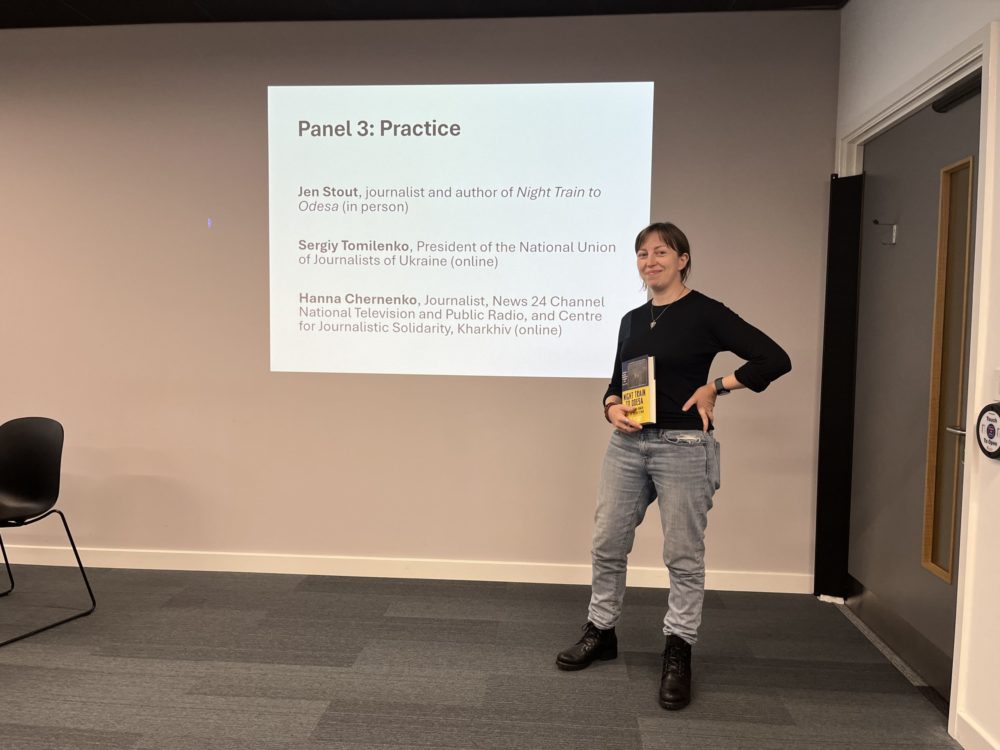‘Lack of foreign reporters is restricting coverage of Ukraine war’

Martin Shipton
The lack of foreign correspondents on the ground is making it difficult to get the full picture of what is happening in the war in Ukraine, a conference at Cardiff University’s journalism school has been told.
Scottish journalist Jen Stout, whose book Night Train to Odesa, describes her coverage of the war from close to the front line and has been a BBC Radio 4 book of the week, told how she had spoken to witnesses who had seen villagers taken off to Russia by Putin’s invasion force – a war crime.
She said: “It’s very important that we get to be there on the ground – not reporting from afar, not just sitting in Kyiv. There’s been a massive influx of journalists and foreign reporters into Ukraine, particularly at the beginning of the war. Some of them are great colleagues and many of them are very professional and did a great job. Some of them are pretendee journalists who are bloggers and weird creepy American men who want to be in a war zone and maybe get people to give them money on Facebook. It’s a really big problem.
“There’s a huge spectrum, from very dodgy pretendee journalists to excellent people gathering evidence that can be used in The Hague. It’s a problem of resources, because where there used to be regional newspapers sending correspondents on staff with insurance, with body armour and with all that back-up to cover a war, even the biggest national newspapers aren’t doing that any more. In Scotland there are three foreign correspondents, and two of us are freelance. And that’s a nation, if you will, of six million people, who claim to be so internationalist and outward looking.”
Safety training
Stout said safety training was essential, not just for journalists themselves, but for the people they were speaking to: “you owe them. You need to be a professional. You need to be trained particularly in ethics and trauma informed reporting. We don’t always make things better, but we should not be making things worse, I think as a bare minimum.”
Other speakers – some contributing online from Ukraine – said many of the shocking incidents that occurred on a daily basis, including war crimes, were not getting the reporting they deserved because of a lack of journalists as well as a sense of attention fatigue about the war, which was what Putin hoped for.
Geopolitical implications
Pontypridd Labour MS Mick Antoniw, whose family is Ukrainian, told the conference: “As a lawyer and as the former Counsel General to the Welsh Government, there is the issue that has arisen now with with what is happening in Ukraine, and the links between what happened in the Holodomor [the Stalin-inspired famine that led to the loss of four million Ukrainian lives in the early 1930s] and the politics and narrative coming from Putin and underpins the invasion of Ukraine.
“Equally there are the geopolitical implications. What is happening in Ukraine is a crossroads geopolitically – and it’s a crossroads for the issue of the rule of law and international law. It poses major challenges for international structures such as the United Nations and the ability of countries that are deliberately breaching the UN Convention being able to participate. I’m referring of course to the role of Russia within that.
“The Convention on Genocide, which was passed by the UN after the Second World War, was promoted by a Jewish Ukrainian lawyer, Raphael Lemkin, and it underpins much of this international law to this day. Lemkin inspired the need for such a Convention because of the Holocaust, but he directly addressed also the Holodomor, which he regarded as an act of genocide.
“The issue of genocide, of course, undermines the narrative that comes from Russia, and that is why information about the Holodomor and the truth about it is so important about understanding the disinformation and the politics that are being presented – that Ukraine is an artificially created country that has always been part of Russia and so on.
“I was in Kyiv up to the day before the invasion. I met with the Mayor there – [Vitali] Klitschko., who I think summarised it very well. He said one of his parents was Ukrainian and one was Russian, but when Putin says they’re going to take back Kyiv, I’d like to remind him that Kyiv existed as a major European city 1,100 years ago. Russia 500 years ago was still a swamp and mud. So the distortion of history has become very important, because Russia did come to exist. It was Muscovy until 500 years ago and it was only really with Peter the Great and then Catherine the Great that the concept of Russia as a country or a nation was created.”
Scholarship
An announcement was made during the conference that the Gareth Jones Memorial Travelling Scholarship was being revived, under which a student journalist will be awarded £2,500 to undertake overseas travel to write an article on the theme Wales in the World that will be published in the Western Mail.
Jones was the Welsh journalist who exposed the Holodomor to the world in 1933. He was murdered two years later on the eve of his 30th birthday, possibly on the orders of Stalin.
Support our Nation today
For the price of a cup of coffee a month you can help us create an independent, not-for-profit, national news service for the people of Wales, by the people of Wales.





